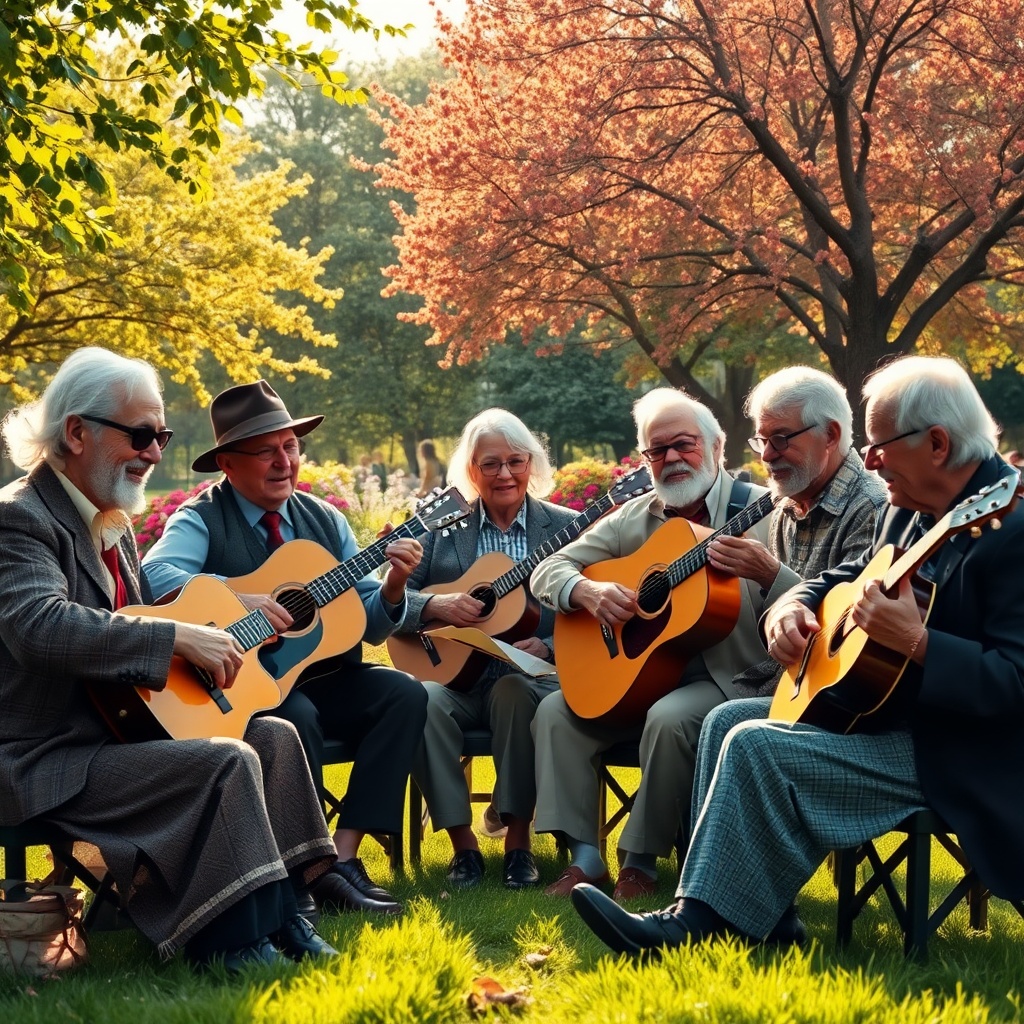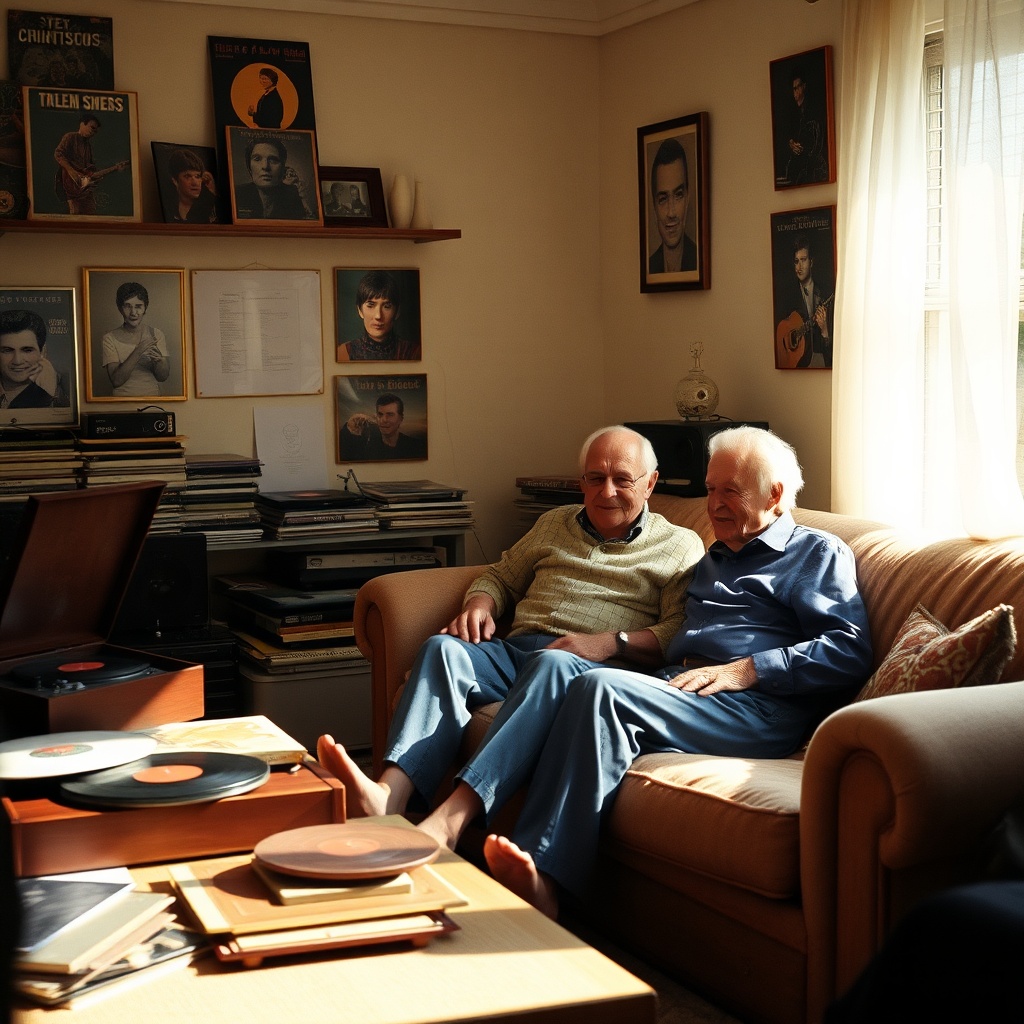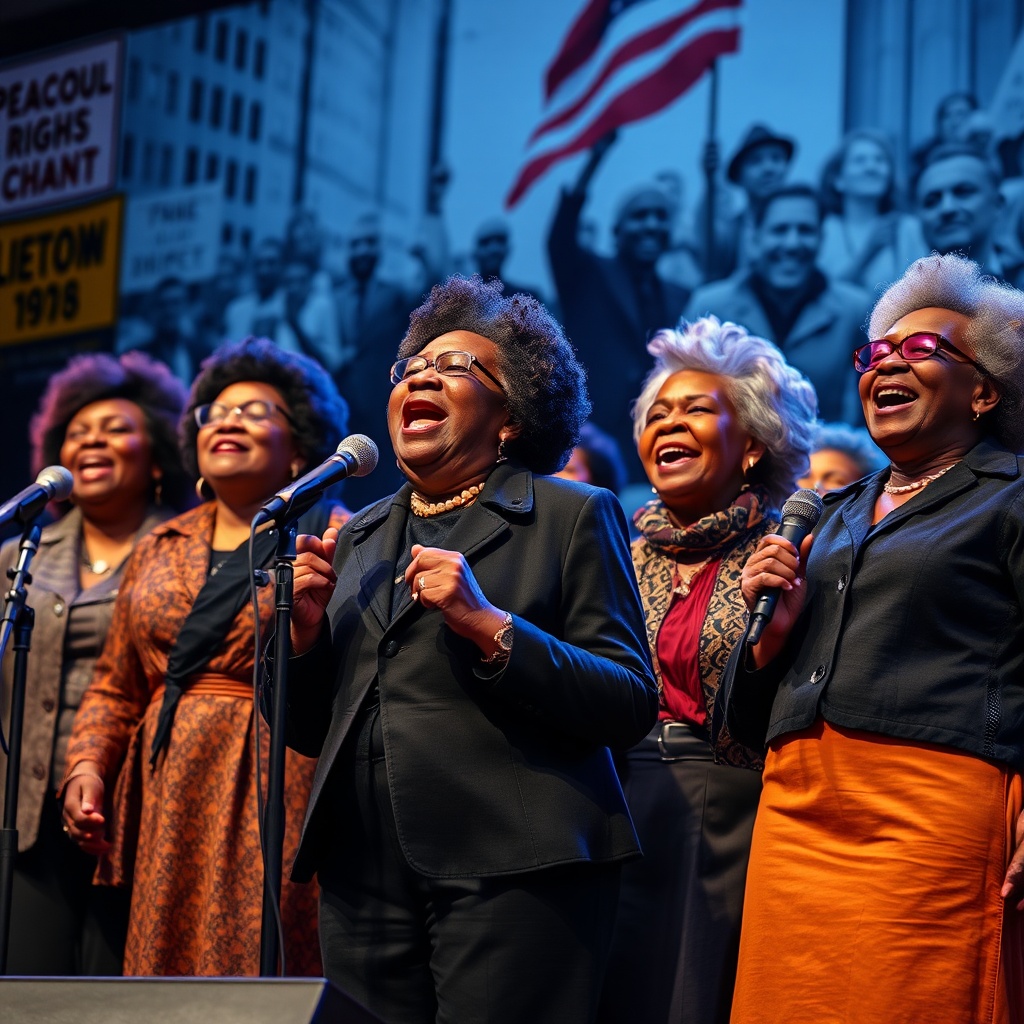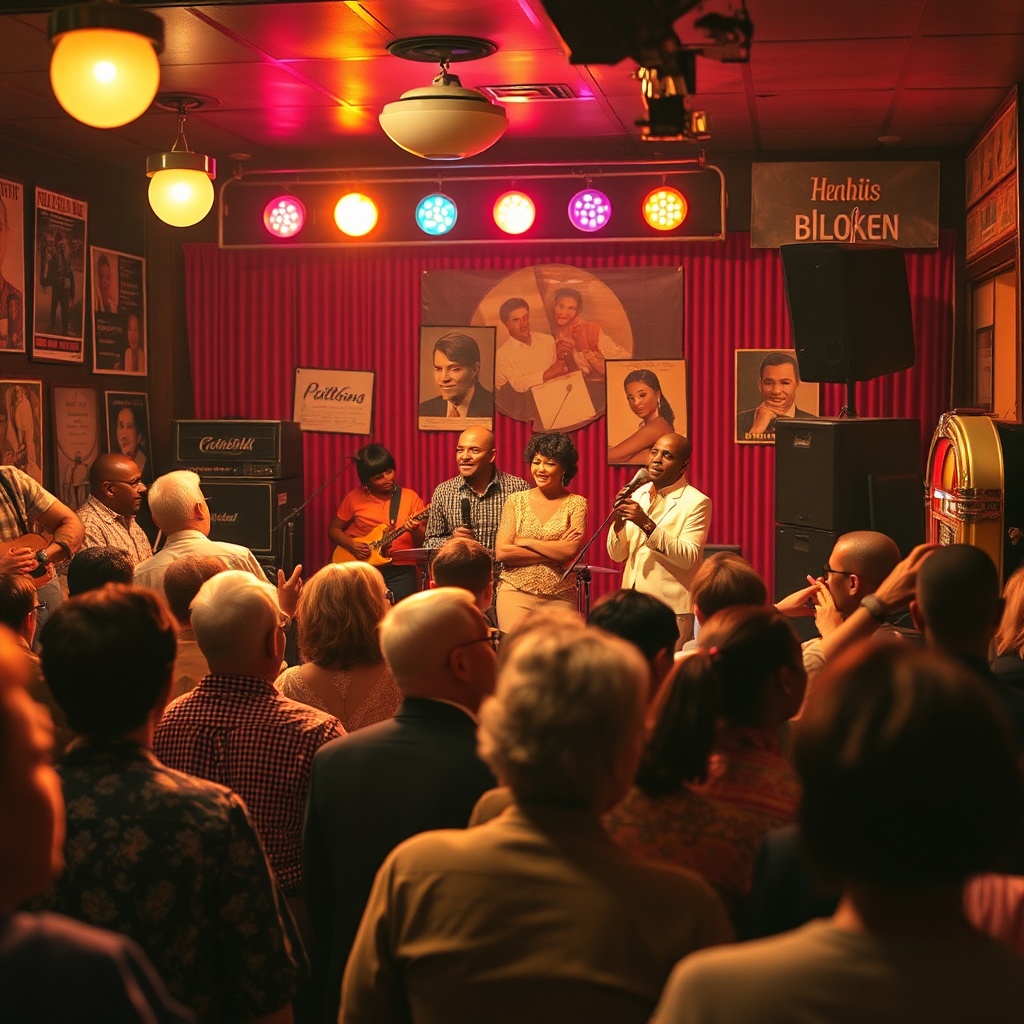Echoes of Change: How Black Voices Redefined Music in Turbulent Times

The 1960s were a time of profound change in America—a decade marked by civil rights movements, social upheaval, and a quest for identity. Within this vibrant landscape, Black singers emerged as powerful voices that not only entertained but also inspired and mobilized communities. This era saw the birth of genres that would redefine music, and the contributions of pioneering Black artists played a pivotal role in shaping the soundscape of a generation.
The Cultural Canvas
As we reflect on the 1960s, let’s consider the cultural canvas on which these artists painted their legacies:
- Social Change: The fight for civil rights resonated through music, with songs becoming anthems for the movement.
- Musical Innovation: Genres like Motown, soul, and rhythm and blues flourished, highlighting the unique experiences and struggles of Black Americans.
- Global Impact: The influence of Black artists transcended borders, inspiring movements and musicians worldwide.
Key Figures in the 1960s Music Revolution
Who were the trailblazers that echoed change? Here are some key figures:
| Artist | Key Contributions | Notable Songs |
|---|---|---|
| Aretha Franklin | Queen of Soul; her music became synonymous with the civil rights movement. | Respect, Think |
| James Brown | Godfather of Soul; his dynamic performances and rhythms influenced funk and hip-hop. | I Got You (I Feel Good), Say It Loud – I’m Black and I’m Proud |
| Marvin Gaye | Pioneered socially conscious music, addressing issues like poverty and war. | What’s Going On, Mercy Mercy Me (The Ecology) |
| Nina Simone | Blended jazz with activism, using her music to speak out against racism and injustice. | Feeling Good, Mississippi Goddam |
The Power of Lyrics
Lyrics from this era were not just words; they were declarations of identity and calls for justice. Consider:
- Upliftment: Songs like Respect and What’s Going On provided hope and a sense of belonging.
- Confrontation: Tracks such as Mississippi Goddam boldly confronted systemic racism and inequality.
Legacy and Influence
The echoes of these Black voices are still felt today. Their influence can be seen in:
- Modern Music: Contemporary artists draw inspiration from the sounds and messages of the 1960s.
- Social Movements: Music continues to be a tool for activism, echoing the passion and resolve of past generations.
Conclusion: Celebrating Resilience
As we reflect on the contributions of pioneering Black singers during the 1960s, we celebrate their resilience and the profound impact they had on music and society. Their voices not only redefined the soundscape of their time but also laid the groundwork for future generations to continue the fight for equality and justice.
What songs or artists from this era resonate with you? Share your thoughts and stories to keep the legacy alive!
Soulful Stories: The Lives Behind the Legendary Melodies of the 1960s

Exploring the Heart of the 1960s Music Scene
As we journey back to the vibrant 1960s, we find ourselves enveloped in melodies that not only stirred the soul but also spoke to the struggles and triumphs of a generation. The pioneering Black singers of this era were not just artists; they were storytellers, weaving their personal experiences into the very fabric of their music.
The Power of Voice
Are you ready to dive into the lives of those whose voices echoed through the streets and concert halls? Each note they sang carried the weight of their stories, deeply rooted in the challenges of their time.
Legendary Voices that Resonate
- Aretha Franklin: Known as the ‘Queen of Soul’, her powerful voice became an anthem for the civil rights movement. Can you recall her unforgettable hit, ‘Respect’?
- Sam Cooke: A pioneer of soul music, Cooke’s smooth vocals and poignant lyrics addressed social issues, making songs like ‘A Change Is Gonna Come’ timeless.
- Marvin Gaye: With his blend of soul and social commentary, Gaye challenged norms and brought attention to important issues through songs like ‘What’s Going On’.
- James Brown: The ‘Godfather of Soul’ infused energy and rhythm into every performance, inspiring generations with his electrifying presence.
Behind the Melodies
Each of these artists faced immense obstacles, yet they transformed pain into power through their music. What stories do you remember from these legends? Their resilience not only shaped their careers but also inspired countless others to find their voices.
Reflecting on Legacy
As we reminisce about the soulful stories behind these legendary melodies, consider the impact that their music continues to have today. How have these artists influenced your own musical journey?
Engaging with the Past
Let’s share our memories. Whether it’s a song that moved you or a live performance you attended, these experiences connect us to the legacy of the 1960s music scene.
Harmonies of Hope: The Impact of Black Singers on the Civil Rights Movement

As we journey back to the vibrant 1960s, a time when the air was thick with both tension and hope, we find that music played a pivotal role in the civil rights movement. Black singers, with their rich voices and profound lyrics, became the anthems of change, giving expression to the struggles and aspirations of a generation.
Let’s explore some of the key figures and their contributions:
| Artist | Key Songs | Impact |
|---|---|---|
| Mahalia Jackson | “How I Got Over” | Her powerful voice and spirituals inspired many during the movement, including Martin Luther King Jr. |
| Sam Cooke | “A Change Is Gonna Come” | This song became an anthem of the civil rights struggle, expressing hope for a better future. |
| Nina Simone | “Mississippi Goddam” | With her bold lyrics, she addressed racial injustice and called for action. |
| James Brown | “Say It Loud – I’m Black and I’m Proud” | His music celebrated Black pride and encouraged unity and resilience. |
These artists didn’t just entertain; they mobilized people, stirred emotions, and brought communities together. Their songs often served as rallying cries during protests, marches, and gatherings, reminding individuals of their shared struggle and resilience.
Interactive Reflection:
Think back to your own experiences during this transformative era. What songs resonate with you? How did they make you feel? Music has a unique ability to connect us to our past and evoke memories of hope and courage.
As we reflect on the legacies of these incredible artists, let’s remember the harmonies they created were not just for entertainment but were the very essence of hope and resistance against oppression. Together, they shaped a soundscape that empowered countless individuals fighting for civil rights.
In the words of Sam Cooke, “It’s been a long, a long time coming, but I know a change gon’ come.” Let us continue to honor their voices today and recognize the indelible mark they left on history.
Rhythms of Resistance: Celebrating the Unforgettable Contributions of Iconic Artists
The 1960s was not just a decade of change; it was a time when music became the heartbeat of a movement. This era saw the rise of iconic Black singers whose voices resonated with the struggles and aspirations of a generation. Let’s take a journey through the rhythms of resistance, exploring the unforgettable contributions of these legendary artists.
Key Artists and Their Impact
| Artist | Notable Songs | Impact |
|---|---|---|
| Aretha Franklin | Respect, (You Make Me Feel Like) A Natural Woman | Aretha’s powerful voice and demand for respect became an anthem for the civil rights movement. |
| James Brown | Say It Loud – I’m Black and I’m Proud, Get Up (I Feel Like Being a) Sex Machine | James Brown’s music celebrated Black pride and empowerment, influencing generations of artists. |
| Sam Cooke | A Change Is Gonna Come, Wonderful World | Cooke’s poignant lyrics captured the struggle for civil rights and hope for a better future. |
| Nina Simone | Feeling Good, Mississippi Goddam | Simone’s music addressed racial injustices and her boldness inspired activism. |
The Legacy of Their Music
Each of these artists not only defined the sound of their time but also laid the groundwork for future generations. Their music was a call to action, a source of comfort, and a means of expression. Let’s reflect on how their legacies continue to inspire:
Empowerment: Their songs resonate with messages of strength and resilience.
Activism: Many of their works were explicitly political, urging listeners to take a stand.
Cultural Influence: They paved the way for various genres, including soul, R&B, and hip-hop.
Interactive Reflection
Consider the following questions as a way to engage with this rich legacy:
Which artist’s music speaks to you the most, and why?
How have the messages of these songs influenced your life or the lives of those around you?
What songs do you think should be added to the timeline of resistance and resilience?
As we celebrate the unforgettable contributions of these iconic artists, we remember that their voices were more than just melodies; they were a powerful force for change. Let us honor their legacies by continuing to share their music and messages, ensuring that the rhythms of resistance echo through the generations.
Melodies of Memory: Remembering the Pioneers Who Shaped a Generation
As we journey back through the rich tapestry of the 1960s, we find ourselves enveloped in the melodies and harmonies that defined a generation. This decade was not only a time of social upheaval but also a flourishing period for music, where the voices of Black artists became a powerful force for change and inspiration. Let’s take a moment to remember these pioneers and their contributions.
The Voices That Moved the World
From the deep, soulful sounds of the gospel tradition to the electrifying rhythms of Motown, the Black singers of the 1960s delivered messages of hope, love, and resilience. Their music was not just entertainment; it was a soundtrack to the Civil Rights Movement and a beacon of empowerment for many.
Spotlight on Pioneering Artists
| Artist | Notable Songs | Impact |
|---|---|---|
| Aretha Franklin | “Respect”, “Natural Woman” | Symbol of empowerment and freedom |
| James Brown | “Say It Loud – I’m Black and I’m Proud” | Anthem of the Black Pride Movement |
| Marvin Gaye | “What’s Going On” | Addressed social issues and brought awareness |
| Nina Simone | “Feeling Good”, “Mississippi Goddam” | Advocate for Civil Rights through music |
Interactive Remembrance
As you think back to this influential era, we invite you to recall the memories associated with these artists. Perhaps you experienced a live performance or danced to their tunes at a gathering. What feelings did their music evoke in you?
Legacy of Resilience
The resilience shown by these artists not only shaped the music of their time but also left an indelible mark on future generations. Their influences can still be heard in today’s music, reminding us of the power of art to inspire change and unite people.
In remembering the pioneers of the 1960s, we celebrate the spirit of resilience and creativity that continues to resonate. Their melodies serve as a reminder of the struggles and triumphs that have paved the way for the next generation of artists. Let their voices continue to inspire us all.
